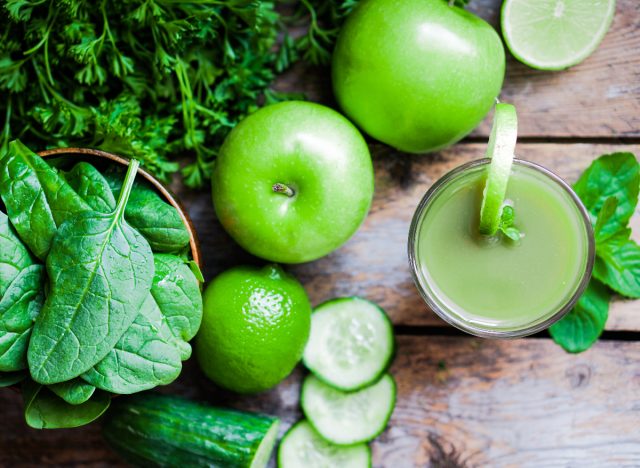When a new year rolls around, there is no doubt many people are dusting off their juicers in preparation for the post-holiday "detox." While this and other forms of restrictive eating are commonplace for many adults following the holiday season, following a diet that hinges on exclusively drinking green juice in lieu of other foods may not be the healthiest approach.
The practice of "eat, drink, and be merry" from Halloween to New Years followed by days or weeks of restrictive juicing plans in January could lead to nutrient deficiencies, energy imbalance, and more. While there may be some positive components of drinking green juice, here is why juicing shouldn't be your main source of nutrition—whether for the New Year or any other season.
Green juicing typically entails pulverizing fresh fruits, veggies, and herbs to separate the liquid components from the fibrous flesh. One upside of juicing is you can significantly increase your intake of fruits and vegetables by including fresh produce in your juice each day. In fact, one study notes that concentrated fruit and vegetable products, juices included, can increase blood levels of many nutrients, such as folate, antioxidants, and vitamin C.
While many nutrients remain intact with juicing, others are significantly reduced. This is the case for fiber, a nutrient that can play a role in lowering blood cholesterol, digestive regularity, and blood sugar stabilization. When the liquid is separated from the pulp of fruits and veggies during juicing, the majority of fiber is left with the pulp—which is often discarded. This means juices do not possess the same benefits that can be found in the whole fruit and veggies used to make the juice.

Another downside to green juice is it contains minimal amounts of essential nutrients, like protein and fat. This makes juicing less satiating, and if these nutrients aren't consumed elsewhere in the diet, research suggests that this could lead to vitamin and nutrient deficiency-related symptoms, creating issues with hair, nail and skin integrity, muscle loss, and delayed wound healing. Green juices are also relatively low in calories. So if following a juice cleanse-focused diet plan for a prolonged period of time, you may experience a significant calorie deficiency, leading to similar adverse side effects impacting your health and metabolism.
"Not only can a severe calorie deficit increase the likelihood of nutrient deficiencies and promote rapid loss of muscle—which can slow metabolism—but it is unrealistic to maintain," Erin Palinski-Wade, RD, CDE, and author of Belly Fat Diet for Dummies reportedly commented .
When fresh produce juice is a component of a well-rounded diet, it can add vitamins, minerals, and antioxidants to your nutrient intake. This is a positive usage of juicing and reasonable way to increase your intake of valuable fruits and vegetables. However, when juicing is used as a way to replace whole foods and balanced meals on a regular basis, this may do more harm than good.
If you are tempted to try juicing, replace no more than one meal per day with juice, and ensure your other meals and snacks contain adequate amounts of nutrients not found in juice, like protein, fat, and fiber. Better yet, instead of juicing, try increasing the number of whole fruits and veggies you eat so you are getting the benefits of juicing in combination with the positive attributes of fiber.
No comments:
Post a Comment